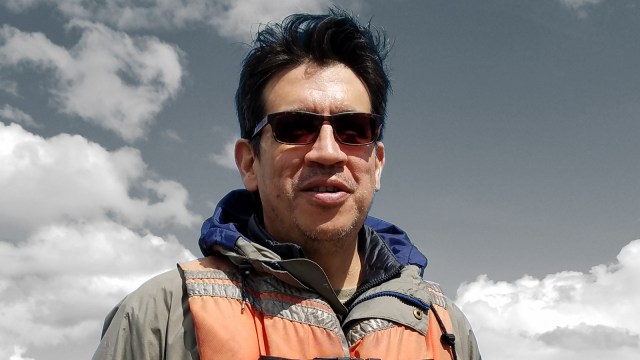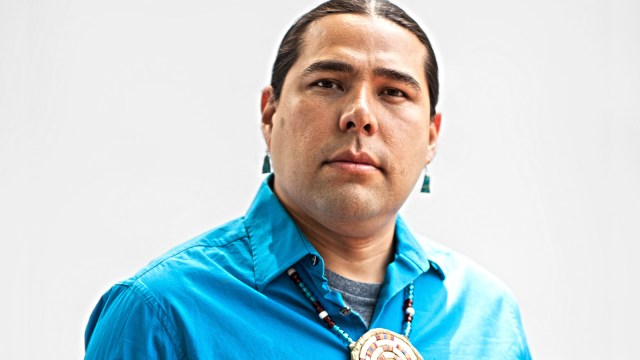Sewage is a problem that few will touch. Catherine Flowers brings civil rights to the fight for environmental justice.

Sewage is a problem that few will touch.

Al Gore's pick
Catherine Flowers brings civil rights to the fight for environmental justice.
Catherine Flowers has been an environmental justice fighter for as long as she can remember. “I grew up an Alabama country girl,” she says, “so I was part of the environmental movement before I even knew what it was. The natural world was my world.”
In 2001, raw sewage leaked into the yards of poor residents in Lowndes County, Alabama, because they had no access to municipal sewer systems. Local government added insult to injury by threatening 37 families with eviction or arrest because they couldn’t afford septic systems. Flowers, who is from Lowndes County, fought back: She negotiated with state government, including then-Alabama Senator Jeff Sessions, to end unfair enforcement policies, and she enlisted the Environmental Protection Agency’s help to fund septic systems. The effort earned her the nickname “The Erin Brockovich of Sewage.”
[pullquote share=”true” tweet=”“Catherine is a shining example of the power individuals have to make a difference.” -@algore” hashtag=”Grist50″ image=”364259″ cite=”Al Gore, used to be our next President” link=”https://new-grist-preprod.go-vip.net/feature/an-inconvenient-truth-oral-history/”]“Catherine is a shining example of the power individuals have to make a measurable difference by educating, advocating, and acting on environmental issues.”[/pullquote]
Flowers was continuing the long tradition of residents fighting for justice in Lowndes County, an epicenter for the civil rights movement. “My own parents had a rich legacy of fighting for civil rights, which to this day informs my work,” she says. “Even today, people share stories about my parents’ acts of kindness or help, and I feel it’s my duty to carry on their work.”
Years later, untreated and leaking sewage remains a persistent problem in much of Alabama. Flowers advocates for sanitation and environmental rights through the organization she founded, the Alabama Center for Rural Enterprise Community Development Corporation (ACRE, for short). She’s working with the EPA and other federal agencies to design affordable septic systems that will one day eliminate the developing-world conditions that Flowers calls Alabama’s “dirty secret.”
Former Vice President Al Gore counts himself as a big fan of Flowers’ work, calling her “a firm advocate for the poor, who recognizes that the climate crisis disproportionately affects the least wealthy and powerful among us.” Flowers says a soon-to-be-published study, based on evidence she helped collect, suggests that tropical parasites are emerging in Alabama due to poverty, poor sanitation, and climate change. “Our residents can have a bigger voice,” she said, “if the media began reporting how climate change is affecting people living in poor rural communities in 2017.” Assignment editors, pay attention.
The world feels pretty broken right now. That’s why we need Fixers — bold problem solvers working toward a planet that doesn’t burn and a future that doesn’t suck. For our annual list of emerging green leaders, Grist brings you 50 innovators with fresh, forward-thinking solutions to some of humanity's biggest challenges. Credits
Meet All The Fixers
-
Donnel Baird
This Brooklynite retrofits cities.
-
Nanette Barragán
This politician fights for polluted communities.
-
Grist Member pick
Nicole Bassett
This clothing expert revives dead threads.
-
John Bourne
This CEO provides clean energy for any budget.
-
Rebecca Burgess
This innovator is stitching together a clothing movement.
-
Van Jones' pick
Gilbert Campbell
This entrepreneur is diversifying cleantech.
-
Karina Castillo
This climate organizer works on the front lines in Miami.
-
Leilani Münter's pick
Chris Castro
This sustainability director drives change in Orlando.
-
Marianne Cufone
This urban farmer grows in tight spaces.
-
Carlos Curbelo
This politician reps bipartisan climate action.
-
Tom Colicchio's pick
Irving Fain
This farmer uses AI for efficiency.
-
Al Gore's pick
Catherine Flowers
This civil rights activist takes on the South's sewage problem.
-
Rahwa Ghirmatzion
This housing advocate is rebuilding Buffalo.
-
Dallas Goldtooth
This comedian spotlights indigenous rights.
-
Ben Hartman
This farmer champions efficiency.
-
Davida Herzl
This startup founder built a Fitbit for the planet.
-
David Hochschild
This policy wonk shows state leadership on solar.
-
Tara Houska
This lawyer stands with indigenous activists.
-
Grist Member pick
Raj Karmani
This developer built an app for food waste.
-
Justin Knopf
This young farmer is saving soil.
-
L.A. Youth Groups
These teens sued for environmental justice.
-
Mike Lewis
This farmer gives vets a chance to grow.
-
Elena Lucas
This entrepreneur helps the solar industry compete.
-
Mark Magaña
This advocate connects green Latinos.
-
Cynthia Malone
This scientist brings social justice to her field.
-
Xiuhtezcatl Martinez
This teenager gives the youngest generation a voice.
-
Ahmina Maxey
This organizer fights for safer waste disposal.
-
Gavin McCormick
This founder empowers people to choose renewables.
-
Lauren McLean
This councilwoman keeps Boise booming.
-
Sophia Mendelsohn
This airline exec is greening travel.
-
Katherine Miller
This food advocate coaches up chefs.
-
Yorman Nuñez
This Bronx community organizer is spreading the wealth.
-
Kait Parker
This weather forecaster shames deniers.
-
Hari Pulapaka
This chef takes a kitchen sink approach to food waste.
-
George Reistad
This civil servant cooks up smart food policy.
-
Erick Rodriguez
This architect designs better neighborhoods.
-
Avital Shavit and Rubina Ghazarian
These transportation gurus coax Angelenos onto bikes.
-
Nicky Sheats
This lawyer connects justice and the environment.
-
Trisha Shrum and Jill Kubit
These mothers bring the future into the present.
-
Varun Sivaram
This physicist is shaping energy policy.
-
Liz Specht
This scientist connects investors to new food tech.
-
Steph Speirs
This CEO plants community solar gardens.
-
Erika Symmonds
This professional trains people for solar jobs.
-
Cameron Russell's pick
Camila Thorndike and Page Atcheson
These activists want carbon polluters to pay.
-
Anthony Torres
This organizer is uniting millennials.
-
Ritchie Torres
This New Yorker champions affordable housing.
-
Uma Valeti
This entrepreneur is making a better burger.
-
Sean A. Watkins
This storyteller puts people first.
-
Evan Weber
This young climate activist is demanding more.
-
Jackie Weidman
This strategist trains clean energy leaders.




